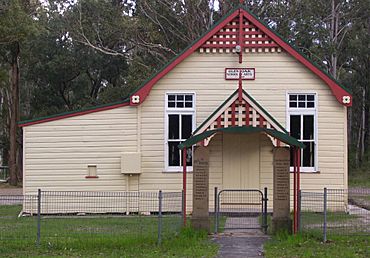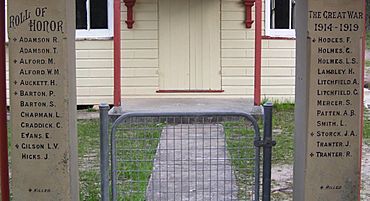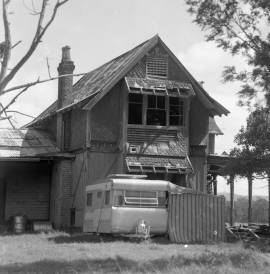Glen Oak, New South Wales facts for kids
Quick facts for kids Glen OakNew South Wales |
|||||||||||||||
|---|---|---|---|---|---|---|---|---|---|---|---|---|---|---|---|

Glen Oak School of Arts (1899)
|
|||||||||||||||

Detail of the Rolls of Honour at the entrance to the School of Arts hall
|
|||||||||||||||
| • Density | 11.16/km2 (28.9/sq mi) | ||||||||||||||
| Postcode(s) | 2320 | ||||||||||||||
| Area | 45.1 km2 (17.4 sq mi) | ||||||||||||||
| Time zone | AEST (UTC+10) | ||||||||||||||
| • Summer (DST) | AEDT (UTC+11) | ||||||||||||||
| Location |
|
||||||||||||||
| LGA(s) |
|
||||||||||||||
| Region | Hunter | ||||||||||||||
| County | Durham | ||||||||||||||
| Parish | Uffington | ||||||||||||||
| State electorate(s) | Port Stephens | ||||||||||||||
| Federal Division(s) | Paterson | ||||||||||||||
|
|||||||||||||||
|
|||||||||||||||
Glen Oak is a small community in the Hunter Region of New South Wales, Australia. It is split between two local government areas: Port Stephens and Dungog. About two-thirds of Glen Oak's 45.1 square kilometers (17.4 square miles) is in Port Stephens. The rest, which is less populated, is in Dungog Shire.
Contents
Glen Oak's Past
Early Settlers and Pathways
One of the first paths in the area was called Binder's Path. It connected Paterson’s Plains (now Paterson and Woodville) to Clarence Town. This path was named after Richard Binder, an early settler. It was very important for people traveling between farms. Today, this historic path is a fire trail.
Important Families and Estates
In the early 1830s, Thomas and Miriam Holmes were a very important family in Glen Oak. They settled on a large piece of land called Oakendale estate. Thomas Holmes helped build roads and was known for opening a stone quarry. He also built the first bridge over Tumbledown Creek.
Other big estates in the area included "Glen Livett" and "Langlands". On June 20, 1889, a fire sadly destroyed the original house at Langlands estate. A new house was built around 1892, but it later fell apart and was taken down in the 1970s.
German Settlers and Farms
After a new land law in 1861, many small farms were started in Glen Oak. Some of these farms were by German families, including the Blum, Storck, Hinkelbein, Kuss, and Tranter families. Ambrose Stork was one of these settlers. He built a house from mud bricks and started a vineyard and winery. This helped Glen Oak grow as a farming area.
Community Buildings and Life
In the late 1800s and early 1900s, Glen Oak had a community hall, a post office, a public school, and a general store. These buildings showed that the community was growing. The Glen Oak School started on the Oakendale estate and became a public school in 1872. It was renamed Glen Oak School in 1889.
The community was most active in the 1910s. They held yearly agricultural shows that many people attended. However, the school closed in 1944. This happened because fewer people lived in the area during World War II. River trade also slowed down, and by the 1950s, much of the village was left empty.
The Glen Oak School of Arts
The Glen Oak School of Arts was built in the late 1800s. It became the main place for social events in Glen Oak. Today, very little is left of the old town. However, the School of Arts hall still stands on Clarence Town Road. It was built in 1899 and is still used for community activities. At the entrance to the hall, there are two pillars. They honor the local men who fought in World War I.



